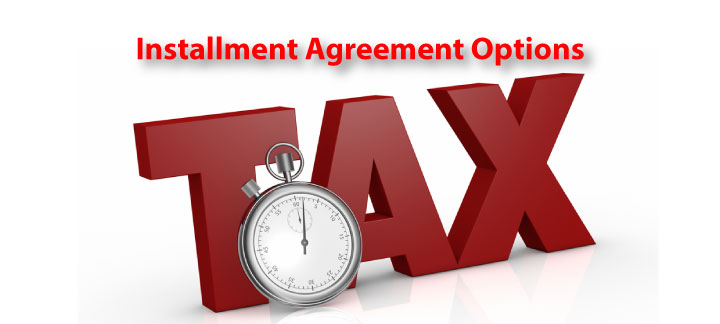Owe Taxes But Can’t Pay it All Today? Installment Agreement
Are there limits on the amount of time I have to pay off my tax debt?
The IRS recently changed its Installment Agreement conditions in order to allow more taxpayers to qualify and catch up on back taxes. They call it the “Fresh Start Installment Agreement.” Under the Fresh Start initiative, the maximum dollar criteria for streamlined installment agreements has been raised from $25,000 to $50,000 and the maximum term to pay has been raised from 5 years to 6 years. Generally, the debt must be paid in full within the 6 years or prior to the Collection Statute Expiration Date, whichever is earlier. During an Installment Agreement, penalties and interest continue to accrue on the amount due but the collection process is halted.
How much will I have to pay every month?
This will depend on the amount of tax due, the time left on the tax collections statute, as well as the taxpayer’s financial situation. Every case will be different and even the same taxpayer’s case can be presented from different points of view. An experienced tax attorney can help a taxpayer negotiate a payment amount that will fit his/her budget and allow for that taxpayer to get out of their tax debt. Taxpayer must be careful to enter into an IA for an amount he/she can realistically afford because if they miss a payment, IRS can void the installment agreement and enter the taxpayer again into the collection process for the entire amount of tax due.
What if I can pay some, but not all, of my tax debt during the collection period?
If full payment cannot be achieved by the Collection Statute Expiration Date, and the taxpayer has some ability to pay, Partial Payment Installment Agreements may be granted. IRM 5.14.1.1.1. In some cases where the taxpayer does not have the ability to pay any part of the tax due, they are placed in Currently Not Collectible (CNC) Status. Penalties and interest continue to accrue while one is on CNC, but the collection process is halted and the taxpayer is not required to make any payments.
How can a tax attorney help me enter into an installment agreement?
If your case is very simple and straightforward, then you can certainly talk with the IRS directly and attempt to negotiate an installment agreement. However, an experienced tax attorney will have a better idea of how to structure an installment agreement that is the most beneficial to you, based on your unique situation and what the IRS will typically agree to. Therefore, even if you are going to negotiate with the IRS yourself, it is wise to consult a tax lawyer prior to getting on the phone with an IRS representative. And, if you simply don’t want to deal with the stress and hassle of talking with the IRS, then a tax attorney can handle the negotiations for you.
The Tax Lawyer - William D Hartsock has been successfully helping clients negotiate with the IRS since the early 1980's. Mr. Hartsock offers free consultations with the full benefit and protections of attorney client privilege to help people clearly understand their situation and options based on the circumstances of their case. To schedule your free consultation simply fill out the contact form found on this page, or call (858)481-4844.



Comments (0)